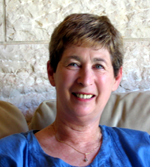By Dorothea Shefer-Vanson

ZIKHRON YA’AKOV, Israel –The tragic and sudden death in a traffic accident of our daughter’s father-in-law, Eli Goldstein, brought an abrupt and untimely stop to the life of a man who was born on the land and worked the land throughout his life. His funeral, which was attended by what seemed to be the entire population of Zikhron Ya’akov, filled every inch of the pedestrian mall that extends from the town’s synagogue to the cemetery. Everyone in Zikhron Ya’akov knew Eli and his family, and everyone mourned the loss of a man who seemed to embody the best of human nature, ethical values and devotion to the land.
We first met Eli some twenty-five years ago, when our daughter brought her then boyfriend home to meet us. Not long after that we met his parents, and that was an experience in itself. Neither Yigal nor I had ever had really close contact with agriculture in Israel and the cultivation of its soil. My own roots go back to London and urban Germany, Yigal’s to a neighborhood on the outskirts of Haifa and before that to Poland, where Jews were not allowed to own land.
But Eli was born in Zikhron Ya’akov, the third generation of its native sons, a scion of one of the town’s founding families. In 1882 his grandfather was one of the Jewish pioneers from Romania, members of the Hovevei Zion movement, who came to what was then Ottoman-ruled Palestine to settle the deserted and arid land. In Israel of today they constitute the true aristocracy, something akin to America’s Pilgrim Fathers. The trials and tribulations that those early settlers endured meant that only the toughest survived, and the members of the Goldstein family must have been very resilient, as well as hard-working, to remain attached to the land.
The first thing you noticed about Eli was his kindly face and warm smile. The second thing was the firmness of his handshake. In fact, a lifetime of working the land had given him hands that felt as strong and tough as a block of wood. At the funeral his sons spoke of his devotion to the land, his attention to detail in everything he did and his dedication to getting the most and the best out of every grain of soil. I remember talking to him one day when he began to speak about the various ailments to which pear trees were prone, and I believe I saw a tear in his eye as he spoke. It was obvious that his fruit trees were close to his heart and he cared for them as if they were his children
He graduated with honours from Israel’s foremost agricultural school, Mikveh Yisrael, and after his military service he proceeded to apply his newly-acquired knowledge to his work on the land he had inherited. His vineyards produced grapes that contributed to the Carmel wines for which Zikhron Ya’akov is famous, and the produce of his various orchards went to market to nourish Israel’s growing population.
To the funeral eulogies given by his wife and four children were added those of fellow-members of Zikhron Ya’akov’s farming community as well as other residents of the town. From everyone we heard the same message: he set a standard of hard work, honesty and decency that will remain for ever with all those who knew him.
*
Shefer-Vanson is an author and freelance writer based in the Jerusalem suburb of Mevasseret Zion. Your comment on this story may be placed in the box below or you may contact the author directly at dorothea.shefer@sdjewishworld.com